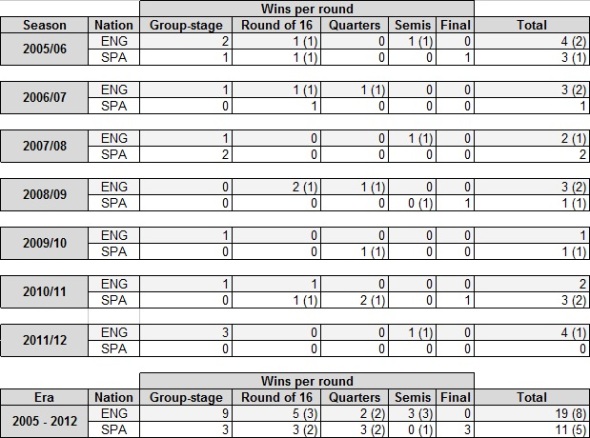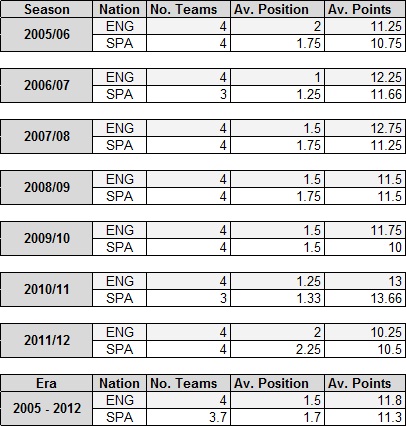Here we go again… La Liga or Premier League?
 Here we go again. Inevitably, Chelsea’s defeat to Atlético Madrid in the European Super Cup at the end of last month saw the above inquisition come to the forefront of people’s minds once more. So, I’ve decided that I may as well give tackling it a go myself.
Here we go again. Inevitably, Chelsea’s defeat to Atlético Madrid in the European Super Cup at the end of last month saw the above inquisition come to the forefront of people’s minds once more. So, I’ve decided that I may as well give tackling it a go myself.
It’s rare that I consult the family copy of The Oxford English Dictionary, but the question is one that has been debated for so long and to such an extent, that I feel it’s necessary to be particularly stringent about what it is we are really asking.
better¹ /ˈbɛtə(r)/ adj., adv., n., & v. —adj. (compar. of GOOD). 1 of a more excellent or outstanding or desirable kind (a better product; it would be better to go home).
So, bearing this in mind and in the words of a manager who achieved success in both countries, let’s begin by looking at the facts.
Atlético’s victory over Chelsea ensured that the Super Cup went to Spain for the fourth year in a row – the Madrid outfit having alternated with Barcelona since 2009. Since the turn of the century in fact, Europe’s take on the Community Shield has been won by a Spanish side seven times compared to England’s twice winners. Of the 26 possible finalists since then, ten have been Spanish and only four have been English. At a risk of sounding condescending, that’s more than double in favour of the Spaniards. It appears to be advantage La Liga already.
To qualify for the right to play for the European Super Cup of course, a club must have lifted either the European Cup or the UEFA Cup the previous season. This involves a team winning one of the Champions League – Europe’s leading club competition, or the Europa League – its bastard child. It is though, after-all, a one-off game and many will argue that it isn’t a valid means to compare the quality of sides from each league. Indeed, since the competition (I use the term loosely) became a one-legged affair in 1998, there have been only two Super Cup finals contested between an English and a Spanish side. Chelsea, as it happens, have taken part in both. Whilst the current European Cup holders succumbed to the Europa League champions this season, the then Cup Winners’ Cup holders beat Atlético’s more glamorous and celebrated Madrid rivals Real, back in 1998. So on that basis, you could argue that it’s all square. Whilst the number of finalists suggests that Spain dominate both tiers of the European game, to gain a clearer picture of how teams from the two respective nations fair in Europe, we need to look at just how they got to the Super Cup final in the first place. Besides, who really gives a shit about the Super Cup anyway? It’s just a glorified friendly. Isn’t that right, Chelsea fans? Celebrate if you win, no harm done if you lose. Moving on then…
Since its conception in 1955, the European Cup has been won by teams of only ten different nations. (Eleven if you count the champions prior to the German reunification of 1990 as West-Germany and not simply, Germany. Politics isn’t my strong point though so I’ll leave it with you to decide for yourself.) Perhaps unsurprisingly, Spain lead the way with thirteen, but they are closely followed by Italy and England, who lay claim to twelve each. Germany, the Netherlands, Portugal, France, Scotland, Romania and the former Republic of Yugloslavia are the remaining countries who can boast teams to have won European football’s top prize. As many football fans know though, Real Madrid, who account for nine of Spain’s victories, didn’t just win the first ever European Cup final, they proceeded to win the four directly following it and so if we are to really scrutinise the English and Spanish leagues in their current states, looking that far back, as fascinating as it may be, is ultimately irrelevant. So I guess we need to start at the point where the current debate actually began to gain momentum, which was some time around 2005 and 2006.
The 2005 European Cup final in Istanbul was a land-mark for English football, as Liverpool took on AC Milan in the Atatürk Olympic Stadium in Istanbul, Turkey. Whilst bitter rivals Manchester United had reached the final in 1999, there had not been another English side besides them present at Europe’s top-table since Liverpool’s infamous night in Belgium saw English clubs banned from the competition for five years back in 1985. That night not only saw the Merseyside outfit lose, but the ban implemented on English sides following the deaths of 39 people in the stands, spelled the end to an unprecedented English dominance which Liverpool themselves had started in 1977, when they beat Borussia Mönchengladbach in Rome to lift their first European Cup. In the seven years which were sandwiched between this historic victory and the loss to Juventus in Heysel, the European Cup was lifted no less than six times by English clubs. Liverpool claimed three more themselves and Brian Clough’s Nottingham Forrest won two on the spin. Even Aston Villa got involved. When Steven Gerrard lifted Ol’ Big-Ears after what was arguably one of the best European Cup finals ever seen, the club once again looked to kick-start another period in which English football could stamp its authority on the European game. If a club which finished fifth in their domestic league, can beat the reigning Italian champions (albeit on penalties), surely the Premier League had a strong case for being Europe’s finest?
Step forward, Barcelona…
The following season saw the English baton passed to Arsenal, but they were beaten in Paris by the Catalans who claimed their second European Cup. Maybe our top-flight wasn’t so good after-all? Barcelona, who had just landed their first La Liga title in six years the previous season, had the reigning World Player of the Year Ronaldinho in their ranks, and a certain Lionel Messi waiting in the wings. Surely, they were only going to get better and better? Next up were Liverpool once more, who succumbed to AC Milan in a reverse of the 2005 final. Whilst the English top-flight was looking far from undisputed top-dog, it was at least represented in the final for the third time in a row. Liverpool had actually knocked out reigning champions Barça in the Round of 16 (Craig Bellamy’s golf-swing and all that), but nevertheless, they were well beaten in the final itself. If the Premier League was to truly emerge as the league to beat, it was time for the two heavy-weights of the division to come out fighting. In 2008, Manchester United and Chelsea did just that, with the Reds beating pre-tournament favourites Barcelona in the semi-final to set up the first all-English European Cup Final against their London-based rivals, which they went on to win on penalties. At this point, people were in no doubt that the Premier League was the number one league in Europe. Spain, whilst by no means also-rans, were a definite second.
Fast forward to a night in Rome a year later though and the reigning champions were on the receiving end of a real footballing lesson – a master-class in the art of possession football. Barcelona were back. With many of the players on show having formed the backbone of the Spain side which had won the European Championships the previous summer, Barcelona eased to a comfortable 2-0 victory. As is so often the case in football, it was the manner of the win which really made people sit up and take note. Whilst the winning side of 2006 had flair in abundance, this side was different somehow. The way they played the game was refreshing in the sense that it was such a novelty. It was completely new, at least to the eyes of many an English audience. Ronaldinho had tragically left the club as an overweight has-been, battling with the fame that being the worlds best player brings. His apprentice, Lionel Messi, had more than stepped into his shoes though and with the maturing Xavi reaching his peak, brought the team a style which looked set to bring them success for many years to come.
Of course, defending the European Cup is no easy feat and has never been done in the present Champions League format. Not since the great AC Milan side which defended their European crown successfully in 1990 has it been achieved. AC’s city rivals Inter, under the tutelage of José Mourinho, beat them in the semi-finals and played out the 2010 final with German giants Bayern Munich – which I personally found quite refreshing. It was strange to not see an English side in the final and so for once, I could be a complete neutral (if there is such a thing). Spain still had some part to play though, with the final taking place in Real Madrid’s Bernabéu stadium.
Order was quickly restored the following year though, as Barcelona once again overcame Manchester United, this time at Wembley, to claim their third European Cup in five years. Without a doubt, we were witnessing one of the greatest club sides to have ever played the game and in Lionel Messi, a player who is now mentioned in the same breath as Maradona, Best, Pelé and Cruyff.
Whilst on five occasions, one or more English sides had reached the final in the six Champions League campaigns since Liverpool’s 2005 victory, only once had they actually won the tournament and this came in 2008, when the European Cup was guaranteed to be going to England anyway. Barcelona had beaten English opposition three times to win their second, third and fourth European crowns, serving to suggest that La Liga was offering the better of the two leagues. Last season however, saw Chelsea, who under the ownership of Russian tycoon Roman Abramovich had developed an unhealthy obsession with winning the European Cup, overcome Barcelona in the semi-finals en route to beating Bayern Munich in the final itself.
But ultimately, the question of which league is better isn’t going to be answered with an ill-eloquent account of recent Champions League history by yours truly. Unfortunately, a bit of head-scratching and maths (*sigh*) is required. Which nation can truly lay claim to being Europe’s top-dog? Let’s find out…
England vs Spain – Champions League
My original intention was to include the 2004/05 campaign, however Spain’s relatively dismal performance that season (only two sides made it out of the groups and both were eliminated at the first knock-out stage), compared to England’s success (Liverpool winning the European Cup), I feel tarnishes the overall results. It wasn’t until the following season after-all, where Barcelona beat Arsenal in the final, that the Spanish top-flight really began to challenge England to a notable degree and the debate began about which league was strongest. The following then, looks at the two countries in the Champions League from (and including) Barcelona’s successful 2005/06 campaign up untill Chelsea’s winning campaign last season.
Head to Head
Firstly, let’s look at what has happened over the past seven seasons when English clubs have been drawn to play Spanish clubs in the Champions League. Using my research, I have created a table to show the number of wins for the two respective nations and at which round of the competition these wins came. In the event of a two-legged knock-out (i.e. the Round of 16; Quarter-Finals & Semi-Finals), an additional point is awarded in brackets to the nation whose team wins the tie outright and in doing so progresses to the next stage. Below, you can see the wins per nation in each of the last seven Champions League campaigns as well as a total for the entire period.

So, there is a clear English dominance over Spain when it comes to teams from each nation playing each other, with eight more wins in one-off matches and three more knock-out round victories. As this table covers all matches played between all the teams of each nation, it goes some way to prove the superiority of English sides over their Spanish counterparts. Obviously, the total wins between the two nations in the Final itself is favourable for Spain, however it’s important to note that these three victories are solely Barcelona’s doing. Does this prove that Spain has the better league? Perhaps not. It does however go to show that Barcelona have one of the best sides in Europe currently. Tell us something we didn’t know already? Okay, let’s look at the two nation’s overall performances in the Champions League as a whole across the same era.
Overall National Performance
Having established that bar the three Finals, English sides tend to come out on top when teams from the two nations play, does this necessarily mean that Premier League sides do better in the Champions League generally in comparison to their La Liga counterparts?
Group Stages
To begin with, let’s look at the way English and Spanish sides compare in the Group-Stages of the Champions League. Below, I have created a table from my research which shows the average final group position and the average number of points attained after all six group matches are completed, as well as an overall average position and average points total since 2005. The table also shows the number of teams from each nation to have made it into the Champions League proper.

What can we make of this? Well firstly, it’s striking how England, unlike Spain, have fulfilled their four-spot allocation each season since 2005, while on two occasions, the Spanish have seen one of their sides fail to make it through the preliminary qualifying rounds. It should be noted however, that had Liverpool not won the European Cup in 2005, England would only have had three representatives themselves during the 2005/06 season as Everton, who pipped Liverpool to 4th in the Premier League the season before, failed to make it through the qualifying rounds. Had they done so though, and assuming Liverpool had still won the 2005 Final, an unprecedented five sides would have represented England during the 2005/06 campaign as Liverpool were allowed special dispensation to defend their trophy despite not qualifying for the competition automatically through the league. This rule has obviously changed since then, as Tottenham fans well know. Now, if a team wins the European Cup but fails to qualify for the following seasons Champions League via their final domestic league position, they now take the place of the lowest qualifying side in their respective league. Chelsea then, having finished last season in sixth, took the place of Spurs who finished in fourth. Football can be a cruel mistress. Anyway, I digress…
In terms of average position and points, England again come out on top, but only just. There isn’t really much in it, however the numbers don’t lie. It’s interesting that Spain’s highest average position and points total came in the two seasons where they were represented by only three teams. So it’s pretty neck and neck so far, but how do teams from the two nations compare when they reach the knock-out stages?
Knock-out Stages
Below I have made a table showing the number of teams to have represented each nation at each round of the knock-out stages. Beneath this there is a final total and a table showing the average number of sides from each nation to be represented at each stage.

Surprise, surprise, the Premier League once again comes out on top in all but one area. The average chance, if you will, of an English team reaching the final and then winning it, is about one in three. Spanish sides however, have a 100% record in finals they have reached. But again, this is entirely Barcelona.
Conclusion? Well, it’s pretty obvious and so to sum it up briefly, the Premier League is far superior to La Liga in terms of Champions League performance, but the team that comes out on top overall is Spanish. Undeniably, the Premier League is generally ‘better’ when it comes to a competition where the elite of each competes, but how do sides from the two leagues fare elsewhere in Europe and how does the competition within each league compare?
Part 2 to follow…